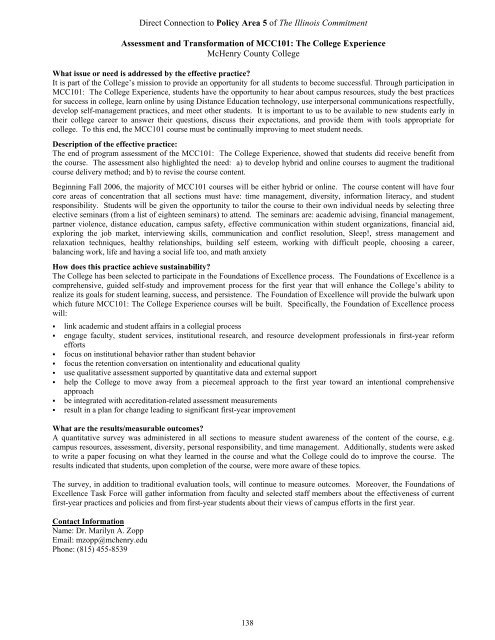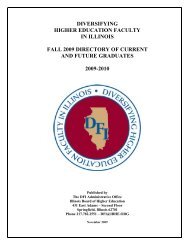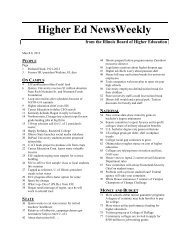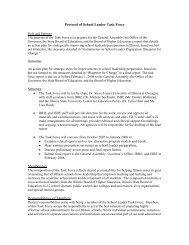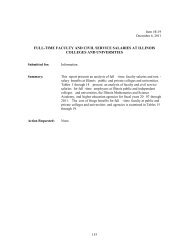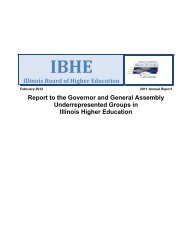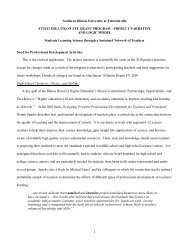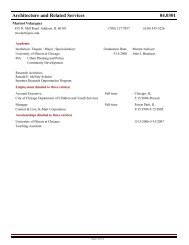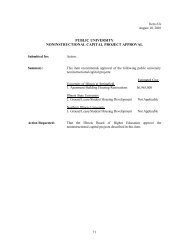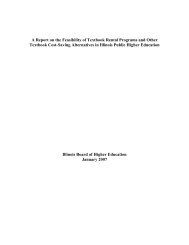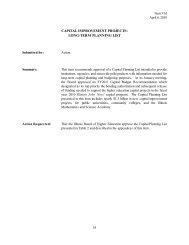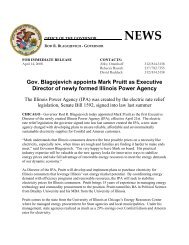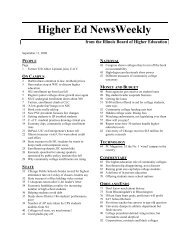Title of Effective Practice: - California Postsecondary Education ...
Title of Effective Practice: - California Postsecondary Education ...
Title of Effective Practice: - California Postsecondary Education ...
You also want an ePaper? Increase the reach of your titles
YUMPU automatically turns print PDFs into web optimized ePapers that Google loves.
Direct Connection to Policy Area 5 <strong>of</strong> The Illinois Commitment<br />
Assessment and Transformation <strong>of</strong> MCC101: The College Experience<br />
McHenry County College<br />
What issue or need is addressed by the effective practice?<br />
It is part <strong>of</strong> the College’s mission to provide an opportunity for all students to become successful. Through participation in<br />
MCC101: The College Experience, students have the opportunity to hear about campus resources, study the best practices<br />
for success in college, learn online by using Distance <strong>Education</strong> technology, use interpersonal communications respectfully,<br />
develop self-management practices, and meet other students. It is important to us to be available to new students early in<br />
their college career to answer their questions, discuss their expectations, and provide them with tools appropriate for<br />
college. To this end, the MCC101 course must be continually improving to meet student needs.<br />
Description <strong>of</strong> the effective practice:<br />
The end <strong>of</strong> program assessment <strong>of</strong> the MCC101: The College Experience, showed that students did receive benefit from<br />
the course. The assessment also highlighted the need: a) to develop hybrid and online courses to augment the traditional<br />
course delivery method; and b) to revise the course content.<br />
Beginning Fall 2006, the majority <strong>of</strong> MCC101 courses will be either hybrid or online. The course content will have four<br />
core areas <strong>of</strong> concentration that all sections must have: time management, diversity, information literacy, and student<br />
responsibility. Students will be given the opportunity to tailor the course to their own individual needs by selecting three<br />
elective seminars (from a list <strong>of</strong> eighteen seminars) to attend. The seminars are: academic advising, financial management,<br />
partner violence, distance education, campus safety, effective communication within student organizations, financial aid,<br />
exploring the job market, interviewing skills, communication and conflict resolution, Sleep!, stress management and<br />
relaxation techniques, healthy relationships, building self esteem, working with difficult people, choosing a career,<br />
balancing work, life and having a social life too, and math anxiety<br />
How does this practice achieve sustainability?<br />
The College has been selected to participate in the Foundations <strong>of</strong> Excellence process. The Foundations <strong>of</strong> Excellence is a<br />
comprehensive, guided self-study and improvement process for the first year that will enhance the College’s ability to<br />
realize its goals for student learning, success, and persistence. The Foundation <strong>of</strong> Excellence will provide the bulwark upon<br />
which future MCC101: The College Experience courses will be built. Specifically, the Foundation <strong>of</strong> Excellence process<br />
will:<br />
• link academic and student affairs in a collegial process<br />
• engage faculty, student services, institutional research, and resource development pr<strong>of</strong>essionals in first-year reform<br />
efforts<br />
• focus on institutional behavior rather than student behavior<br />
• focus the retention conversation on intentionality and educational quality<br />
• use qualitative assessment supported by quantitative data and external support<br />
• help the College to move away from a piecemeal approach to the first year toward an intentional comprehensive<br />
approach<br />
• be integrated with accreditation-related assessment measurements<br />
• result in a plan for change leading to significant first-year improvement<br />
What are the results/measurable outcomes?<br />
A quantitative survey was administered in all sections to measure student awareness <strong>of</strong> the content <strong>of</strong> the course, e.g.<br />
campus resources, assessment, diversity, personal responsibility, and time management. Additionally, students were asked<br />
to write a paper focusing on what they learned in the course and what the College could do to improve the course. The<br />
results indicated that students, upon completion <strong>of</strong> the course, were more aware <strong>of</strong> these topics.<br />
The survey, in addition to traditional evaluation tools, will continue to measure outcomes. Moreover, the Foundations <strong>of</strong><br />
Excellence Task Force will gather information from faculty and selected staff members about the effectiveness <strong>of</strong> current<br />
first-year practices and policies and from first-year students about their views <strong>of</strong> campus efforts in the first year.<br />
Contact Information<br />
Name: Dr. Marilyn A. Zopp<br />
Email: mzopp@mchenry.edu<br />
Phone: (815) 455-8539<br />
138


